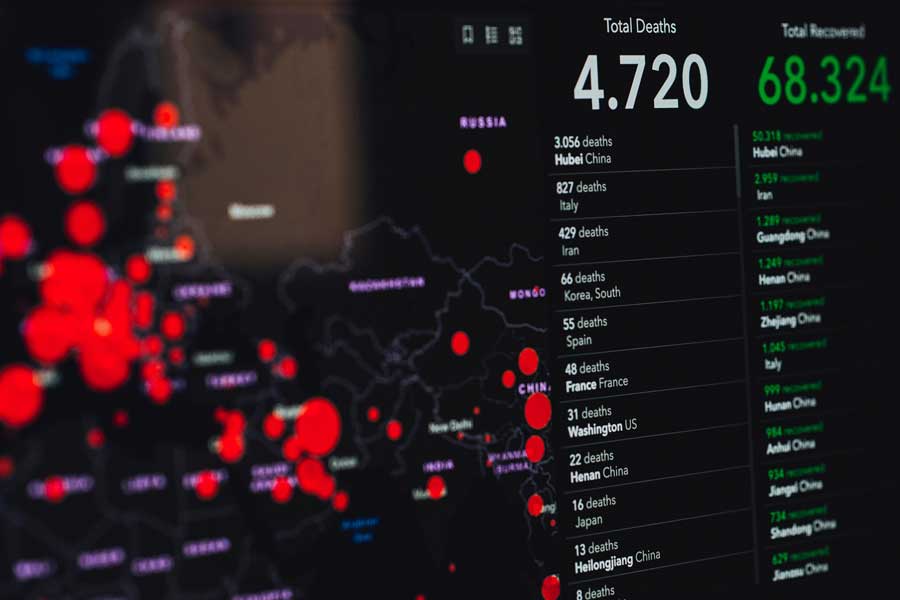All praises are for Allah, The Almighty, and may His peace and blessing be upon His true servant and final Messenger Muhammad, his Companions and his household.
The world is currently facing one of the worse epidemics in modern times. The Coronavirus disease (COVID-19) was first announced the end of December in 2019. In Wuhan, the capital city of Central China’s Hubei province, a virus had emerged that has a very high mortality rate. Most people in the West didn’t pay too much attention to it, thinking it was confined to China. In fact, many people shrugged off any possibility of this virus going beyond the borders of China.
But then came a rude awakening! Over 7,000 miles from China, every Masjid and Islamic center in the U.S. realized they were in the midst of a fiqhi quagmire a lot more intense than the sighting of the new moon at the end of the month of Ramadhan to determine Eid-ul Fitr. It is the first time the Muslim community is faced with the problem of deciding whether to pray Salaatul Jumu’ah in the Masjid or to cancel it altogether. This is not a simple decision.
American Muslims remember that one of their most fearful periods was the months and years that followed 9/11. Despite the tremendous fears, Muslims never thought of cancelling Jumu’ah. They always found a way and continued one of the greatest symbols of Muslims coming together each week to worship Allah SWT. Masjids did whatever it took to keep the attendees safe, from local brothers providing security to hiring police officers to keep guard; but the Salaah, and particularly Salaatul Jumu’ah, went on.
Now things are different. COVID-19, SARS, and MERS are all Coronaviruses that cause acute respiratory syndromes. During the SARS outbreak in 2003, only eight Americans were diagnosed. And in 2014 only two Americans tested positive for MERS. But now COVID-19 has a foothold in most countries throughout the world, and as of the middle of March, there were more than 8,500 known cases reported in the U.S. This poses a problem for Muslims, as all Americans have been asked to practice social distancing, keeping at least six feet away from people and staying home as much as possible
But while this discourse goes on in the Muslim community, there is an aspect of the epidemic that is beyond a fiqhi perspective and it is about how we process these difficult times and seek the deeper meaning about what is happening and why. After all, nothing happens except by the will of Allah SWT. As we are told in the Qur’an, “No misfortune can happen on earth or in your souls but is recorded in a decree before We bring it into existence; that is truly easy for Allah” (57:22). So, beyond the issue of Salaatul Jumu’ah, let us contemplate the reality of this challenge we are facing.
An Epidemic Is from the Qadr of Allah SWT
According to a Sahih Muslim hadeeth, everything that was going to happen throughout time was written down 50,000 years before the heavens and earth were created. So, when a Muslim hears of a calamity such as the Coronavirus, there should be no panic or depression. Instead, we understand first and foremost that it is from the Qadr of Allah SWT. Allah SWT says: “No disaster strikes except by permission of Allah. And whoever believes in Allah, He will guide his heart. And Allah is knowing of all things” (64:11). This is further explained in the hadith of Jabir (RA) who reported that Rasoolullah SAS said: ”No slave of Allah will truly believe until he believes in al-Qadr; its good and bad from Allah, and until he knows that what has befallen him was not going to miss him, and that what missed him was not going to befall him” (At-Tirmidhi). Muslims should not believe that everything will be good in this world; and when calamity befalls him, he must not question the Will of the Creator.
Another famous hadith that we hear often is the one in which Ibn Abbas (RA)says: “I was riding behind the Messenger of Allah, SAS, when he said to me, ’Young man, I will teach you some words. Be mindful of Allah and he will protect you. Be mindful of Allah and you will find Him before you. If you ask, ask from Allah. If you seek help, seek help from Allah. Know that if the nations gathered together to benefit you, they will not benefit you unless Allah has decreed it for you. And if the nations gathered together to harm you, they will not harm you unless Allah has decreed it for you. The pens have been lifted and the pages have dried” (At-Tirmidhi).
Allah SWT Is the Ultimate Power
Every form of epidemic is from the Qudrah (Power) of Allah SWT. Viruses are microscopic pieces of genetic material He SWT uses to remind us of our weakness while showing His power. He says: “…Mankind was created weak” (4:28). And in another verse, “And none knows the forces of your Lord except Him. And it is not but a reminder to humanity” (74: 31). He SWT also tells us, “And to Allah belong the forces of the heavens and the earth. And ever is Allah Exalted in Might and Wise” (48:7). Time and time again, when mankind deviates and forgets who has the real power, He sends some calamity for humanity to reflect.
Balancing Between Tawakkul (Trust in Allah) and Taking the Asbaab (Means)
Islam requires from us to do two things. First, a Believer must have tawakkul, or trust in Allah SWT, that He is sufficient as our help. He SWT says: “And whoever relies upon Allah, then He is sufficient for him. Indeed, Allah will accomplish His purpose. Allah has already set for everything a measure” (65:3).
Second, a believer must seek the means, or asbaab, whether it is by seeking protection or seeking treatment and medical intervention. Abdullah ibn Abbas reported: “Umar ibn al-Khattab (RA) went out to Syria until he arrived at Sargh. The commanders of the army, Abu ‘Ubaydah ibn al-Jarrah and his companions, met him and told him that an epidemic had befallen the land of Syria. Umar announced to the people, ’I will turn back in the morning, so you must as well.’ Abu ‘Ubaydah said, ‘Are you fleeing from the decree of Allah?’ Umar said, ’Would that another had said so, O Abu ‘Ubaydah! Yes, we are fleeing from the decree of Allah to the decree of Allah.’” Another hadeeth describes this well: “Do you not see that if you had camels descending in a valley with two fields, one of them fertile and the other barren, you would graze in the fertile field by the decree of Allah or you would graze in the barren field by the decree of Allah?” (Al-Bukhari ).
What Are Some of the Asbaab for the Coronavirus?
• Cleanliness is vitally important. This cannot be overemphasized. This should be the norm for Muslims at all times. Even before the appearance of the Coronavirus, there have been some unhygienic practices at the Masaajid especially during the flu months and in the month of Ramadan. Cleanliness, according to a hadith is half of faith. Allah SWT says: “Indeed, Allah loves those who are constantly repentant and loves those who purify themselves” (2:222).
• Frequent handwashing with soap is necessary.
• Do not shake hands or kiss others as a greeting.
• Cough or sneeze into your elbow rather than your hands. Discard tissues immediately.
• Stay at home except for necessary reasons such as work, food shopping, or trips to the pharmacy.
• When you are out, keep six feet away from others.
• Those who are sick must stay at home and contact their doctor for instructions on what to do.
An Epidemic Can Be a Punishment from Allah SWT or a Trial in Life
Allah SWT has prepared for those who deny Him and His Messengers punishment both in this world and the Hereafter. ”But those who strive against Our Signs, to frustrate them, for such will be a penalty, a punishment most humiliating” (34:5).
Pharaoh called himself god and forced his people to worship him. Today, how many pharaoh-like leaders think they are unstoppable? Then comes something so minute, microscopic, among the minutest of Allah’s creation, and the entire world is impacted in every possible way, changing everyone’s life for the foreseeable future. When the Signs from Allah SWT came to Pharaoh including lice, locusts, and frogs, he was helpless. What an irony that when death approached while he was drowning, Pharaoh called upon Allah SWT for help!
Muslims must understand that when a punishment comes, it may affect both believers and deniers of Allah SWT. Allah SWT says: “And fear a trial which affects not exclusively those of you who do wrong; and know that Allah is strict in punishment” (9:25). For believers it can be a test of faith. Trials and tribulations are part of life. Allah SWT informs us of, and warns us, that when we are afflicted, we should remember that it is ultimately He who controls all of our affairs. It is He who will provide help, as He says in the Qur’an: “Do you think that you will enter Paradise without such [trials] as came to those who passed away before you? They were afflicted with severe poverty and ailments and were so shaken that even the Messenger and those who believed along with him said, ‘When [will] the help of Allah [come]?’ Yes! Certainly, the help of Allah is near!” (2:214).
How Should We React Spiritually When Such Calamities Appear?
Be patient for patience in such time is very necessary.
Allah SWT says: “We will certainly test you with some fear and hunger, and some loss of possessions and lives and crops. But give good news to the steadfast. Those who, when a calamity afflicts them, say, ’To God we belong, and to Him we will return’” (2:156-157).
Aisha RA (the wife of the Prophet) reports that she asked Allah’s Apostle about plague, and Allah’s Apostle informed her saying, “Plague was a punishment which Allah used to send on whom He wished, but Allah made it a blessing for the believers. None [among the believers] remains patient in a land in which plague has broken out and considers that nothing will befall him except what Allah has ordained for him, but that Allah will grant him a reward similar to that of a martyr” (Al-Bukhari).
Don’t give up on the Mercy of Allah SWT.
Allah SWT tells us, “Say, ’O My servants who have transgressed against themselves [by sinning], do not despair of the mercy of Allah. Indeed, Allah forgives all sins. Indeed, it is He who is the Forgiving, the Merciful” (39:53). We learn from the example of Prophet Ayyub (AS). He was tested with a great illness. He lost everything — his family, wealth, and health. Yet he persevered and did not give up on the mercy of Allah SWT. Allah SWT says: “And Ayyub, when he called to his Lord, saying, ‘Adversity has afflicted me and You are the Most Merciful.’ So, We answered him and removed his affliction and We gave him his family and the like thereof along with them, as a mercy from Us and a reminder to worshippers” (21:83-84).
Make lots of du’as.
Du’a is the power and source of strength for the believers. Allah SWT commands by way of invitation and warning: “And your Lord says, ’Call upon Me; I will respond to you.’ Indeed, those who are too proud to worship Me will enter Hell in humiliation” (40:60). We are reminded that du’a is not always answered on our terms but by the Mercy and Wisdom of Allah SWT. Rasoolullah SAS said: “One of you may be answered so long as he is not hasty and says, ‘I made du’a but I got no response’” (Al-Bukhari, Muslim).
Finally, Only Allah SWT Removes Calamities
Allah SWT says, “And if Allah should touch you with adversity, there is no remover of it except Him; and if He intends for you good, then there is no repeller of His bounty. He causes it to reach whom He wills of His servants. And He is the Forgiving, the Merciful” (10:107).
We pray that Allah SWT protect us all and save us from such calamity.





